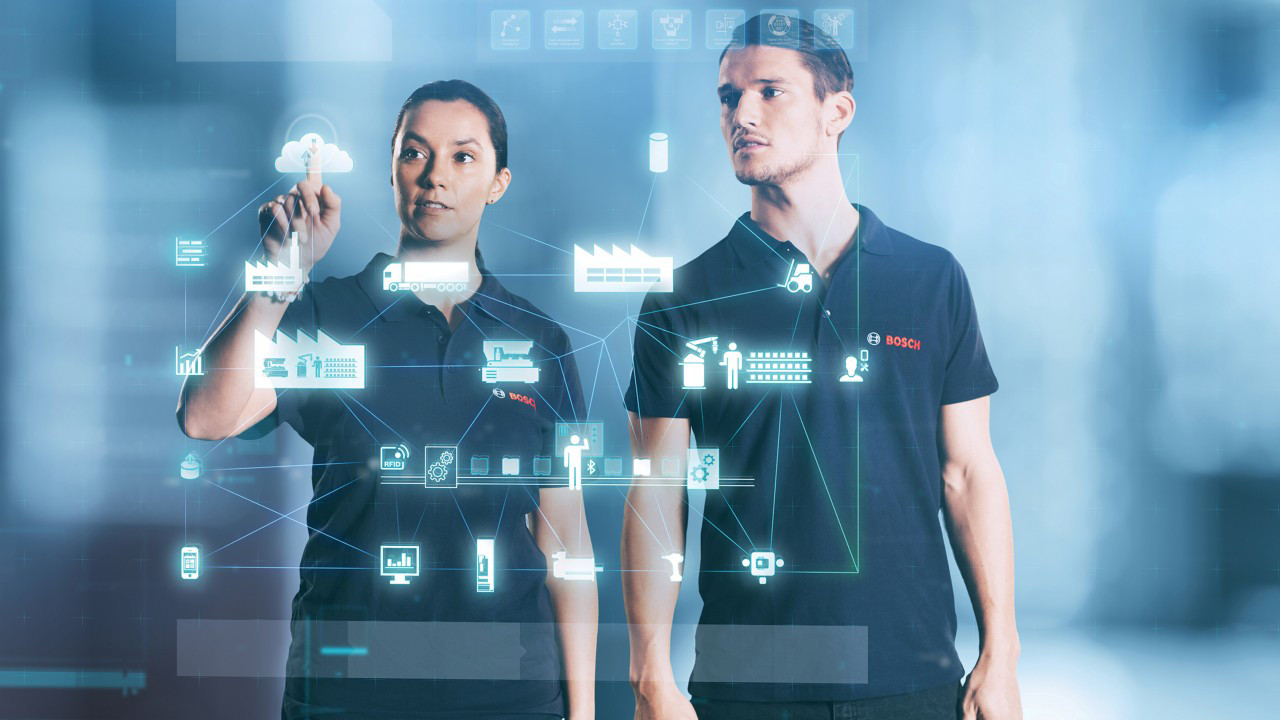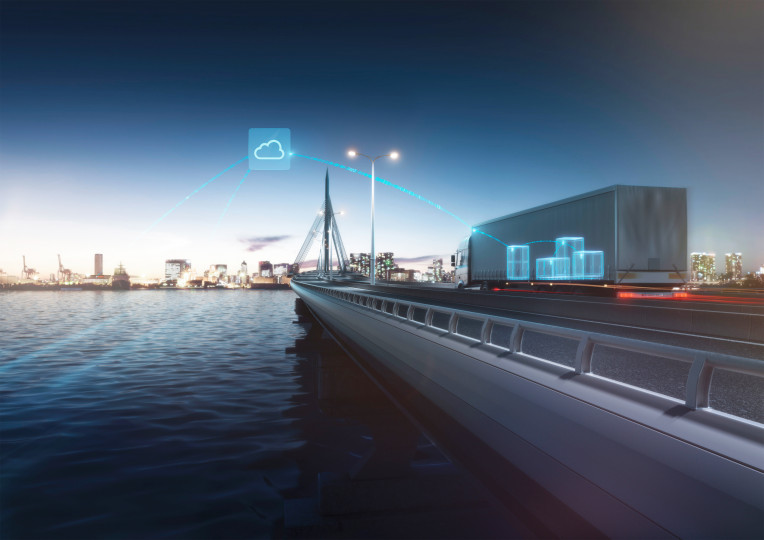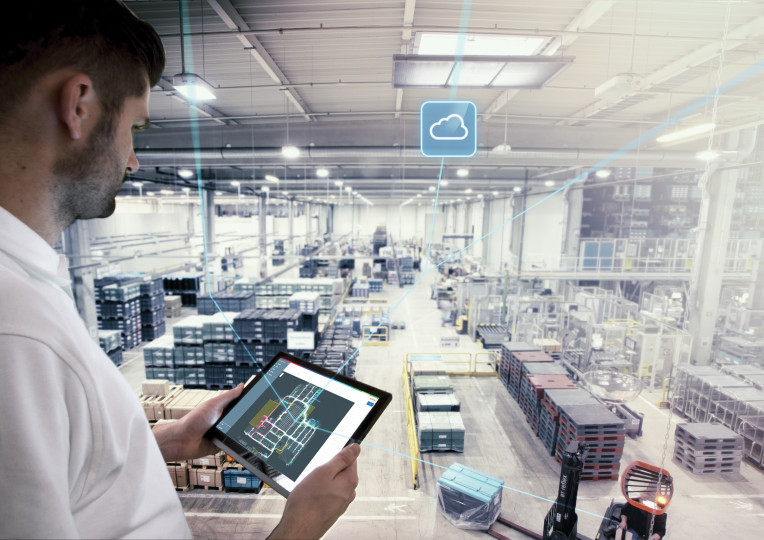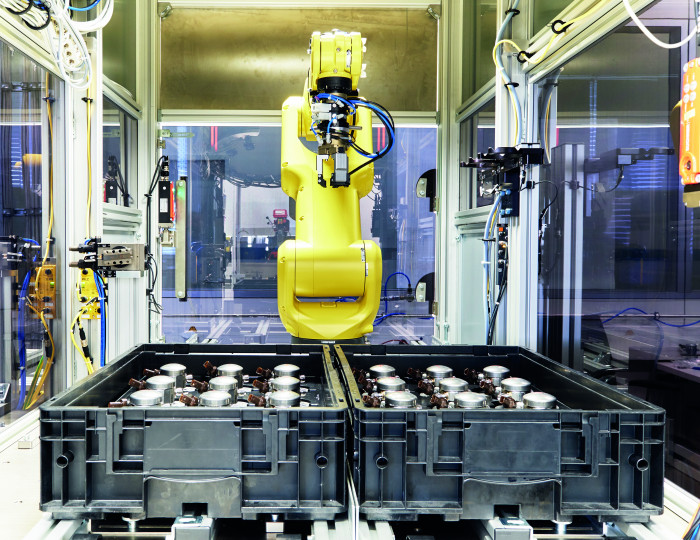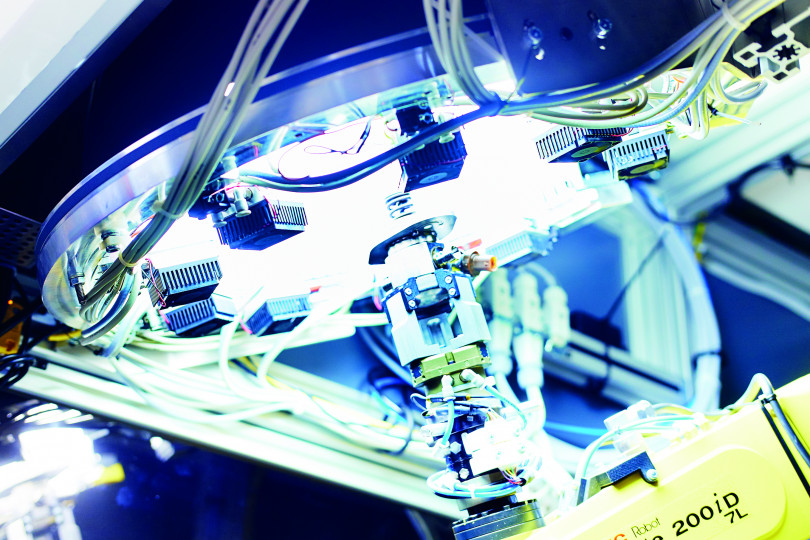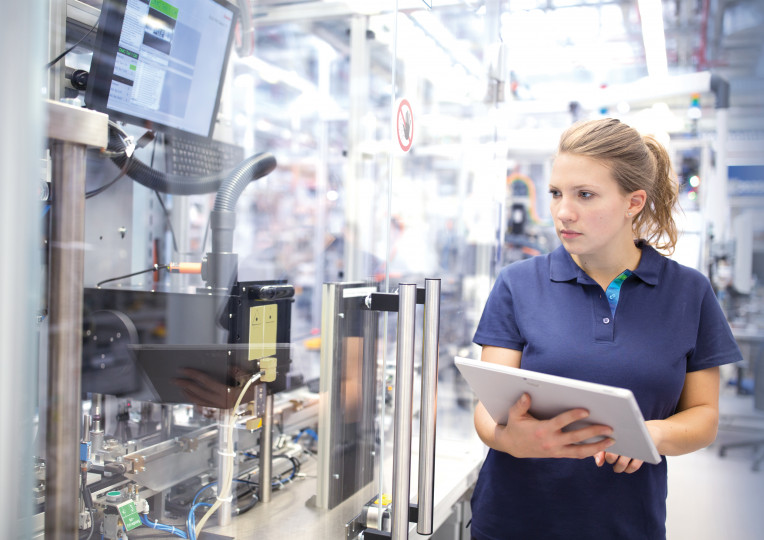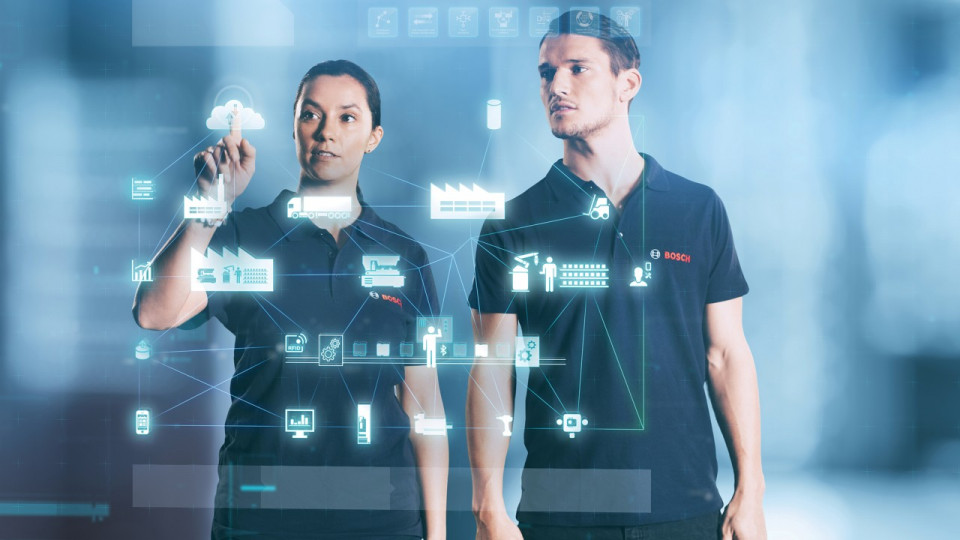Stuttgart, Germany – Industry 4.0 has definitely become a part of the factory scene, where it is paying off: over the past four years, Bosch has made more than 1.5 billion euros with Industry 4.0 applications. As early as 2022, Bosch wants to generate annual sales of over a billion euros with Industry 4.0. The company is presenting the factory of the future at Hannover Messe: autonomous transport vehicles deliver components to digital workspaces, robotics solutions support workers in manufacturing, and quality inspection is performed with the help of artificial intelligence (AI). Thanks to 5G, communication between machines and systems runs smoothly and in near real time. Bosch is turning vision into reality.
Industry 4.0 improves competitiveness
Bosch recognized the potential of Industry 4.0 early on: the company began connecting manufacturing and logistics in 2012. This strategy improves competitiveness, and Bosch’s Industrial Technology business sector is seeing robust growth: according to preliminary figures, last year it grew by 8.9 percent. After adjusting for exchange-rate effects, this growth measured 11 percent. Sales rose to 7.4 billion euros. “Industry 4.0 pays off. Digital and connected solutions are making factories more efficient, more flexible, and more productive,” says Bosch board of management member Rolf Najork, who oversees the business sector. Bosch projects are bearing this out. For example, Bosch’s plant at Blaichach in southern Germany introduced modern manufacturing technologies that increased ABS and ESP volumes by 200 percent over six years – without expanding facilities or making acquisitions.
Bosch enters the intralogistics market with autonomous transport systems
What use is highly automated manufacturing if the materials don’t arrive at the production line on time and in the right quantities? “If you take the idea of the factory of the future to its logical conclusion, distinctions break down and you see that manufacturing and logistics have to be thought of as one element. This is the only way for Industry 4.0 to succeed in practice,” Najork says. At Hannover Messe, Bosch Rexroth is presenting the ActiveShuttle: this autonomous transport vehicle carries materials from the warehouse to the precise spot on the production line where they need to be. An integrated hub platform facilitates autonomous loading and unloading, so there’s no need for workers to lift a finger. Equipped with laser scanners, the ActiveShuttle finds its own route, can recognize other vehicles and people – and can also learn: the transport system creates its own map of the site and updates it continuously.
Software creates the foundation for Industry 4.0
The three pillars of success in the factory of the future are people, machines, and data. To ensure they work together harmoniously, they need intelligent software. “Industry 4.0 would be inconceivable without software. With our Bosch Connected Industry operating unit, we are further expanding our leading position in Industry 4.0 and pooling our software and services expertise under the name Nexeed,” says Dr. Stefan Aßmann, who heads up the Bosch Connected Industry business unit. This unit helps the company’s customers monitor transports, manufacture products quickly and efficiently, and deliver those products safely, securely, and on time. To give one example: using Nexeed Track and Trace, the freight itself transmits information on its location, temperature, and vibrations. This means logistics experts can monitor freight status at all times and determine if the goods will arrive on time.
Artificial intelligence is a key technology of the future
With the help of artificial intelligence, machines can learn how to be smart and to anticipate. This harbors huge potential as machines relieve people of time-consuming, strenuous tasks. “Bosch regards AI as a key technology. Our goal is for all Bosch products to be equipped with AI, or for AI to have played a part in their development and manufacture, by the middle of the next decade,” Najork says. To meet that goal, Bosch is focusing on AI that is safe, robust, and explainable. At Hannover Messe, Bosch will present ViPAS, an AI-based system for visual quality control. Equipped with a gripper arm, cutting-edge camera technology, and intelligent software, the system is simple and convenient to operate. In a pilot project at the Bosch plant in Nuremberg, ViPAS completed 12,000 test procedures with a success rate of 99.9 percent. This means ViPAS sorted the parts as “OK” or “not OK” with near-perfect accuracy. The next step is to further refine ViPAS in-house to get the technology ready for use at various plants.
5G accelerates Industry 4.0
The new 5G mobile communications standard plays a key role in many Industry 4.0 applications. 5G transmits data up to 100 times faster than the previous standard. Reliability has increased while data transmission delays have fallen to a minimum. “5G will be the central nervous system in the factory of the future,” says Andreas Müller, a Bosch researcher and chairman of the 5G Alliance for Connected Industries and Automation (5G-ACIA). To shape the new mobile standard right from the outset so that it meets the future needs of industry, Bosch took on the chair of the organization, which was set up in 2018. To date, the initiative has brought together more than 40 companies and research institutions from around the world. Bosch plans to test 5G in its own plants before the end of this year. At Hannover Messe, Bosch will be joining with its partners Nokia, Qualcomm, and BigRep to present the advantages of the new standard. To do so, the companies are bringing connectivity to a 3D printer for the first time with the help of 5G. This will make it possible to take some of the control elements that would normally be integrated into the machine and outsource them to a local manufacturing cloud. Machines with this feature are leaner, cheaper, and easier to maintain.
Sweden is a strategically important partner for Bosch
Bosch and Sweden are connected by a long tradition. The international supplier of technology and services has had a presence in this year’s Hannover Messe partner country since 1904. Bosch currently employs more than 1,600 associates at nine locations in Sweden, generating sales of around 1.1 billion euros there in 2018. Here, too, Bosch is focusing on connected solutions for improving quality and service. For example, Bosch Rexroth’s plant in Mellansel in eastern Sweden connects its Hägglunds brand high-performance hydraulic systems with sensors and cloud-based applications, and employs machine learning methods. This results in greater productivity and improved availability of the drive systems. One customer that has put the Industry 4.0 solution into practice is LKAB at the iron ore mine in Kiruna, the northernmost city in Sweden.
Mónika Hack
+36 70 510 5516
The Bosch Group is a leading global supplier of technology and services. It employs roughly 410,000 associates worldwide (as of December 31, 2018). According to preliminary figures, the company generated sales from operations of 77.9 billion euros in 2018. Its operations are divided into four business sectors: Mobility Solutions, Industrial Technology, Consumer Goods, and Energy and Building Technology. As a leading IoT company, Bosch offers innovative solutions for smart homes, smart cities, connected mobility, and connected manufacturing. It uses its expertise in sensor technology, software, and services, as well as its own IoT cloud, to offer its customers connected, cross-domain solutions from a single source. The Bosch Group’s strategic objective is to deliver innovations for a connected life. Bosch improves quality of life worldwide with products and services that are innovative and spark enthusiasm. In short, Bosch creates technology that is “Invented for life.” The Bosch Group comprises Robert Bosch GmbH and its roughly 440 subsidiary and regional companies in 60 countries. Including sales and service partners, Bosch’s global manufacturing, engineering, and sales network covers nearly every country in the world. The basis for the company’s future growth is its innovative strength. At 125 locations across the globe, Bosch employs some 69,500 associates in research and development.
The company was set up in Stuttgart in 1886 by Robert Bosch (1861−1942) as “Workshop for Precision Mechanics and Electrical Engineering.” The special ownership structure of Robert Bosch GmbH guarantees the entrepreneurial freedom of the Bosch Group, making it possible for the company to plan over the long term and to undertake significant upfront investments in the safeguarding of its future. Ninety-two percent of the share capital of Robert Bosch GmbH is held by Robert Bosch Stiftung GmbH, a charitable foundation. The majority of voting rights are held by Robert Bosch Industrietreuhand KG, an industrial trust. The entrepreneurial ownership functions are carried out by the trust. The remaining shares are held by the Bosch family and by Robert Bosch GmbH.
Additional information is available online at www.bosch.hu, iot.boschblog.hu, www.bosch.com, www.iot.bosch.com, www.bosch-press.com, www.twitter.com/BoschPresse

